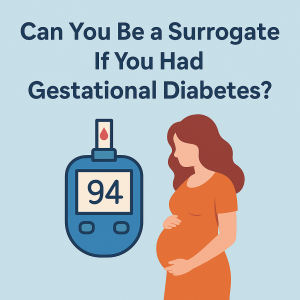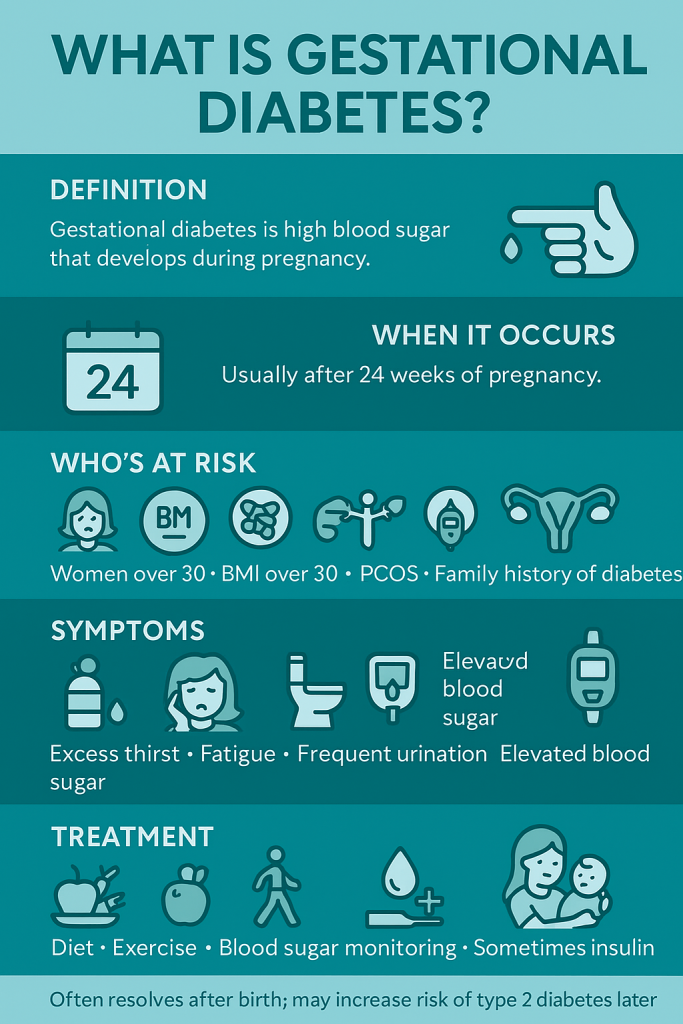
However, the severity, treatment, and outcome of your previous pregnancy will play a major role in determining your eligibility. At Los Angeles Surrogacy, we evaluate each applicant’s health history closely — including gestational diabetes — to ensure safe and successful journeys for everyone involved.
In this guide, we’ll answer:
-
Am I eligible to be a surrogate if I had gestational diabetes?
-
Does having gestational diabetes disqualify me from surrogacy?
-
What are the risks of surrogacy after gestational diabetes?
-
What do surrogacy agencies require?
-
How does the screening process work?
Whether you experienced mild, diet-controlled GD or needed insulin, this article will walk you through your next steps.
Can I Be a Surrogate If I Had Gestational Diabetes?
Yes — in many cases.
Women who had mild, diet-controlled gestational diabetes and carried a healthy full-term pregnancy often qualify to become surrogates. However, each case is reviewed individually by fertility specialists.
You may not qualify if you had:
-
Severe insulin-dependent gestational diabetes
-
Complications such as preeclampsia, preterm delivery, or macrosomia (very large baby)
-
Persistent blood sugar issues after delivery
What Is Gestational Diabetes?
Gestational diabetes (GD) is a type of diabetes that develops during pregnancy due to hormonal changes that affect how your body uses insulin. It typically appears after the 24th week and usually resolves after childbirth.
Common GD symptoms include:
-
Elevated blood sugar levels
-
Increased thirst or hunger
-
Fatigue
-
Frequent urination
Gestational diabetes does not mean you had diabetes before pregnancy or will have it afterward — but it does increase the risk of future type 2 diabetes or recurrence in future pregnancies.
How Common Is Gestational Diabetes?
According to the CDC, 2% to 10% of pregnancies in the U.S. are affected by gestational diabetes each year. It’s more common among:
-
Women over age 30
-
Those with a BMI over 30
-
Women with PCOS
-
Those with a family history of diabetes
Despite its frequency, many women have healthy pregnancies and deliveries with proper management — which is why prior GD isn’t always disqualifying for surrogacy.
Surrogacy Eligibility With a History of Gestational Diabetes
At Los Angeles Surrogacy, we work with fertility clinics to review a surrogate’s complete pregnancy history — including GD.
You may be eligible if:
-
Your GD was controlled with diet and exercise
-
You had no complications during pregnancy or delivery
-
Your blood sugar levels returned to normal postpartum
-
Your most recent pregnancy (including any surrogacy) was complication-free
-
You meet all other surrogacy health requirements
You may not be eligible if:
-
You needed insulin to manage GD
-
You had preeclampsia, premature birth, or fetal macrosomia
-
You were diagnosed with type 2 diabetes after pregnancy
-
You’ve had GD in multiple pregnancies
-
You have a high BMI (over 33)
What Surrogacy Agencies Look For
Each surrogacy agency sets its own health and risk tolerance guidelines. At Los Angeles Surrogacy, we partner only with top fertility clinics in California, and we all follow strict medical protocols.
We require:
-
A history of at least one full-term, healthy pregnancy
-
No history of uncontrolled diabetes or insulin use
-
Normal postpartum glucose test results
-
BMI below 33
-
No active diagnosis of pre-diabetes or type 2 diabetes
-
Medical clearance from a reproductive endocrinologist
Medical Screening for Surrogates With Gestational Diabetes History
Medical Record Review
We collect OB/GYN records from your prior pregnancies to assess:
-
Gestational diabetes diagnosis and treatment method
-
Fetal weight and delivery notes
-
Postpartum recovery
-
Blood sugar test results
Health Screening
You’ll undergo comprehensive testing including:
-
Fasting glucose
-
Hemoglobin A1C
-
Lipid panel
-
Hormone levels
-
BMI and blood pressure
Fertility Clinic Evaluation
Your records will be reviewed by a reproductive endocrinologist to assess your surrogacy eligibility.
Does Gestational Diabetes Affect IVF or Pregnancy in Surrogacy?
Yes — if not monitored closely.
Even in gestational carriers, elevated blood sugar levels can lead to:
-
Increased risk of miscarriage or stillbirth
-
Macrosomia, raising the chance of C-section
-
High maternal blood pressure or preeclampsia
-
Preterm labor
That’s why tight medical oversight and stable glucose levels are essential — even before pregnancy begins.
Surrogacy Process for Women With Gestational Diabetes History
Here’s what you can expect if you had GD and apply to be a surrogate:
-
Submit a pre-screening application at LosAngelesSurrogacy.com
-
Speak with a coordinator about your pregnancy and health history
-
Submit OB records for all prior pregnancies
-
Complete a lab panel and physical screening
-
Receive final approval from our partnered fertility clinic
-
Be matched with intended parents
-
Undergo embryo transfer prep and begin pregnancy
At every step, your case manager will help you navigate any health concerns — including past GD — and ensure the process is safe for everyone.
What If I’ve Had Gestational Diabetes More Than Once?
Multiple instances of GD may increase the chance of long-term insulin resistance — and may signal higher risk pregnancies in the future.
You may still be eligible, but you’ll likely need to:
-
Demonstrate that your glucose levels normalized after each pregnancy
-
Have completed a recent glucose tolerance test
-
Show no evidence of type 2 diabetes onset
If the results are favorable and your medical team clears you, you may still qualify.
Surrogate Compensation With Gestational Diabetes History
If you are approved, your compensation is not affected by having had GD — unless special arrangements are needed during pregnancy.
Standard surrogate pay in California includes:
| Compensation Category | Typical Amount |
|---|---|
| Base Pay | $50,000–$75,000+ |
| Monthly Allowance | $250–$300 |
| Medication Start Fee | $500–$750 |
| Embryo Transfer Fee | $1,000–$1,500 |
| Maternity Clothing | $500+ |
| C-section Bonus | $2,000+ |
| Multiples Bonus | $5,000–$10,000 |
| Lost Wages | Based on job/salary |
All health-related expenses, testing, insurance, and travel are fully covered by the intended parents.
Key Takeaways
• You can be a surrogate after gestational diabetes — especially if it was mild and diet-controlled.
• Fertility clinics review your entire pregnancy and postpartum health history to make sure it’s safe.
• You’ll need to pass a blood glucose screening and physical exam to qualify.
• Insulin-dependent GD or multiple pregnancies with complications may reduce eligibility.
• Surrogates with a history of GD still receive full compensation if approved.
FAQs About Gestational Diabetes and Surrogacy
Can I become a surrogate if I had gestational diabetes 5 years ago?
Yes, especially if your blood sugar levels returned to normal and you’ve had a healthy pregnancy since.
Do surrogacy agencies disqualify for gestational diabetes?
Not automatically. Agencies assess how well your GD was managed and the outcome of the pregnancy.
Will I need extra tests if I had gestational diabetes?
Yes. You’ll need glucose tolerance testing and possible additional labs before final clearance.
Can I have another surrogate pregnancy after GD?
Possibly — if your OB confirms it’s safe, and your medical screening comes back normal.
What if my blood sugar is slightly elevated now?
That could affect your eligibility. You’ll need normal results on your A1C and fasting glucose tests to qualify.
Ready to See If You Qualify?
If you’ve had gestational diabetes and are wondering whether you can be a surrogate in California, we’re here to help.
Call 800-204-7129
Or start your pre-screening today at LosAngelesSurrogacy.com
You may still be eligible — and your experience could help build someone’s family.

